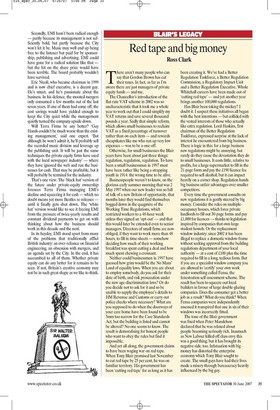Red tape and big money
Ross Clark There aren't many people who can say that Gordon Brown has cut their taxes. In fact, as far as I'm aware there are just managers of private equity funds — and me.
The Chancellor's introduction of the flat-rate VAT scheme in 2002 was so uncharacteristic that it took me a whole year to work out that I could simplify my VAT returns and save several thousand pounds a year. Sadly that simple reform, which allows small businesses to reclaim VAT as a fixed percentage of turnover rather than on each item — and rewards cheapskates like me who run up very low expenses — was to be a one-off.
Otherwise, for small businesses the Blair years have been about just three things: regulation, regulation, regulation. To have been a small businessman in 1997 must have been rather like being a strapping youth in 1914: the wrong time to be alive.
Businesspeople weren't to know, on the glorious early summer morning that was 2 May 1997 when our new leader was so full of talk of a new Britain of opportunity, that months later they would find themselves bogged down in the quagmire of the Working Time Regulations, which restricted workers to a 48-hour week unless they signed an 'opt-out' — and that this would later be extended even to senior managers. Directors of small firms are now obliged, if they want to work more than 48 hours, to fill in time-sheets — somehow deciding how much of their working breakfast was spent cutting a deal and how much spent chewing a croissant.
Neither could businessmen in 1997 have guessed how grim would be the No Mans' Land of equality laws. When you are about to employ somebody, do you ask for their date of birth, and risk prosecution under the new age-discrimination laws? Or do you decide not to ask for it and so be unable to supply the employee's details to HM Revenue and Customs or carry out police checks where necessary? What are you supposed to do when the doorways of your care home have been found to be 5mm too narrow for the Care Standards Act, but the building is listed and cannot be altered? No one seems to know. The result is demoralising for honest people who want to obey the rules but find it impossible.
And yet all along, the government claims to have been waging war on red tape. When Tony Blair promised last November to cut red tape by 25 per cent, he was on familiar territory. His government has been 'cutting red tape' for as long as it has been creating it. We've had a Better Regulation Taskforce, a Better Regulation Commission, a Regulatory Impact Unit and a Better Regulation Executive. Whole Whitehall careers have been made out of 'cutting red tape' — and yet another year brings another 100,000 regulations.
Has Blair been taking the mickey? I doubt it. I suspect these initiatives all began with the best intentions — but collided with the vested interests of those who actually like extra regulation. Lord Haskins, first chairman of the Better Regulation Taskforce, expressed surprise at the lack of interest he encountered from big business. There is logic in this: for a large business new regulations might be annoying, but rarely do they cause the devastation they do to small businesses. It costs little, relative to profits, for a large supermarket to fill in the 21-page form and pay the £190 licence fee required to sell alcohol; but it can impact heavily on a corner shop. Regulation hands big business unfair advantages over smaller competitors.
Every time the government consults on new regulations it is gently steered by big money. Consider the rules on multipleoccupancy houses, which force private landlords to fill out 30-page forms and pay £1,000 for licences — thanks to legislation inspired by companies that own large student hostels. Or the replacement window industry: since 2002 it has been illegal to replace a domestic window-frame without seeking approval from the building regulations department of your local authority — at a cost of £100 plus the time required to fill in a long, tedious form. But if you are a specialist window company you are allowed to 'certify' your own work under something called Fensa, the fenestration self-assessment scheme. The result has been to squeeze out local builders in favour of large double-glazing companies. Does the consumer get a better job as a result? What do you think? When Fensa companies were independently assessed it transpired that one in six of their windows was incorrectly fitted.
The tone of the Blair government was fixed when Peter Mandelson declared that he was relaxed about people becoming seriously rich. Inasmuch as New Labour killed off class envy this was a good thing; but it has brought its negative side, too. Infatuation with big money has distorted the enterprise economy which Tony Blair sought to create. The small guys have had their lives made a misery through bureaucracy heavily influenced by the big guy.


















































































 Previous page
Previous page